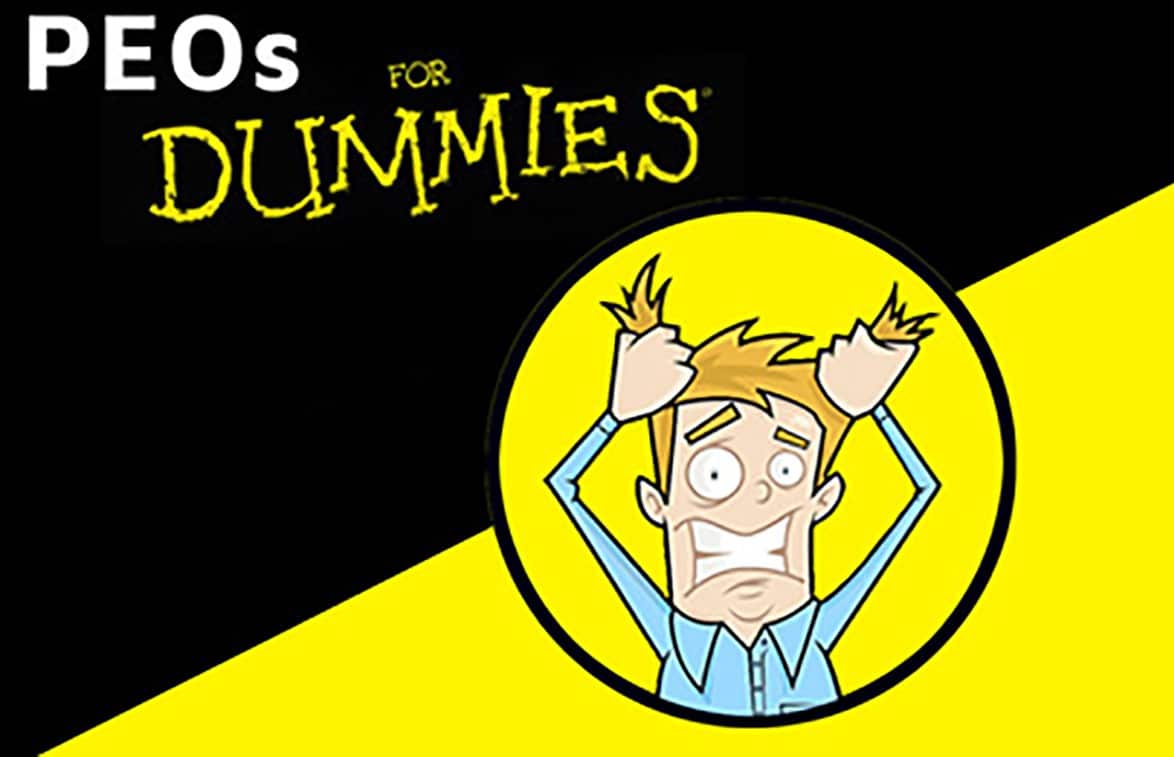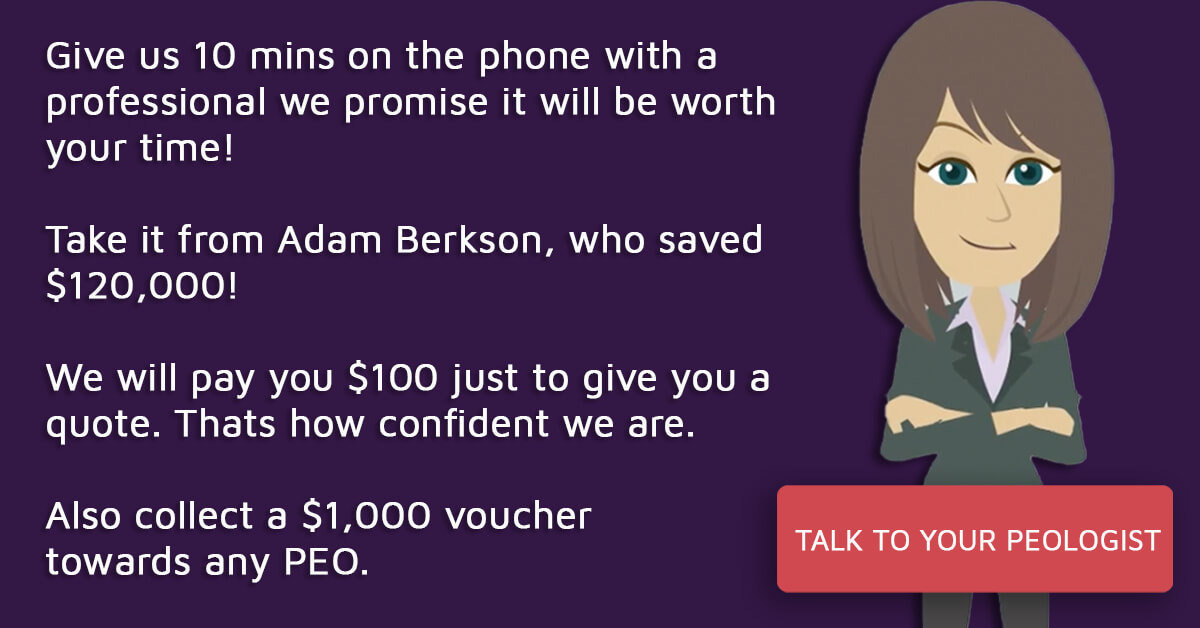
PEOs for Dummies and Smarties

We never liked the name of this book series – it implies that somehow people will accept that they might be dummies very humbly, but the truth is you’re smart.
Actually, it should be PEOs for SMARTIES – plain English information to help you understand stuff you would have no reason to have to understand without having a ton of experience of doing it. The big picture and important facts you have broken down and information you really need to know.
Throughout our site each section e.g. Frequently Asked Questions, or The Insider Secrets Brochure, or Information for “Smarties” – is simply that – straight talk on PEOs.
Straightforward answers to the questions that you want to know the truth about – without any sales twists!
However, there is one thing that people always want to know that is not easily put into a simple FAQ, and that is “Who is the best PEO?”
The truth is that PEOs do specialize –
- they specialize in size,
- different fields and industries,
- in different locations,
- different average client sizes,
- and service models.
This isn’t some purposefully vague answer – there are a lot of different ways PEOs get the job done. That is also why we created the Compare Hassle-Free option. You tell us who you want quotes and information from we get the quotes and compile it all together in one easy to access place curated just for you. Tell us who to compare here.
Some take the millennial, tech-oriented, low person service, DIY self-serve beautiful platforms approach.
Others combine great technology with great people and plenty of them! Some of these even have lawyers on staff for every case!
Some are between, some have high turnover, and some have people that are mediocre as an organization.
There are some who may have been the best last year and then something happened, they got taken over or they changed the software, or they changed the compensation for the service people. It can be one of a plethora of things!
As you can see there can be a lot of variety in skill in the field. This is the intangible part that we can’t answer from that question without a short conversation and actually getting quotes (but we make it easy).
That’s why there’s no simple answer to who is the best, and also depending on the quarter their rates vary tremendously and you can’t generalize that either.
But all the other questions we think we’ve answered in the secret’s dummies FAQ section.
Asking the right questions (about each component) and doing all of the comparisons is not simple.
Determining if they will work for you is not simple.
Knowing what goes on behind the scenes that aren’t on the spreadsheets – their software, services, renewals, and pricing – is not simple to find out. (The PEO salesperson certainly isn’t telling you everything that might be a problem with their company.)
So, is there an easy way to learn quickly before you spin your wheels and waste your time? Yes, and that’s part of what this blog will help you with.
If PEOs make things easy, why are there so many ways you can make a wrong decision in picking one? Let’s take a step back and look at your current process.
For each product, vendor, service, or module you have now, you have some expert/broker/consultant to tell you the difference between the vendors/competitors in the marketplace. For health insurance, you have a broker; for workers comp, you have a broker; for 401K, you have some type of broker or administrator. Oh, how you wish you had a proper broker for HRIS systems. You probably also wish you had a broker or advisor for HR issues. We all need a deep bench and a variety of expertise on demand for this.
So that is your current world. It is disjointed and inefficient to have so many parts (which is one reason a PEO can be terrific), but – or rather, when you combine all these services, you now really need an expert that knows each of these components with each of the services. None of your current brokers know about all of the other components, and they certainly don’t know about what each PEO provides and how they combine. And believe me – if you try to do it yourself and trust each PEO salesperson, you will make a mistake.
So, what do you do? How do you arm yourself with the right questions and protect your company from making the wrong decision?
Here are some more questions we answer:
Are PEOs really that great? If so, why doesn’t everyone have one?
Do they really save a lot? What happens next year? They all sound the same – but they are definitely not. How do you know what they each are in advance?
What is different about PEOs now from a few years ago?
How much do they really cost, and what do you need to look out for? What are the nickel and dime fees you need to know about? What is hidden? You will be shocked at what you find.
Are the contracts for all of these services different between the different PEOs, and are they complicated? YES. From the termination fees to your responsibilities, they are very different and have serious implications. This is not like just changing health insurance carriers.
What is the difference between a CPEO and a PEO?
What kind of rate and other guarantees can/should we get?
Are there penalties and other fees we need to be aware of?
What does the ACA filing actually entail from your end? They all say they “do it” – but that means very different processes.
Why are there so many questions about transparency when you research this? Because most fees and other services aren’t transparent. We will tell you what to look out for.
Can you tell me about PEPM vs. % of Payroll options? Yes, we will.
Are there more reasons I can’t trust the PEO salesperson? Yes, and we’ll give you some ugly examples.
PEOs have evolved to make life easier, better, and cheaper and to eliminate waste-of-time processes for important parts of a business.
AND, all the stuff you read about how great they are and how much money they can save you CAN BE TRUE – SOMETIMES. Sometimes, though, the numbers are really compelling, but there are reasons why a PEO isn’t right for you or why that vendor’s sales pitch just isn’t true. We will help make sure you don’t make the wrong choice for the wrong reasons. We’ll make sure you KNOW the hidden facts so you do make the right choice for the right reasons – and maybe decide a PEO isn’t right for you for the right reasons.
Let’s be clear when I say that this industry is evolving. Up until 5 years ago, this was not, in general, a quality industry. AND IT’S STILL RAMPANT WITH BAD ACTORS – bad players, inconsistent service, and software that really isn’t user-friendly or integrated along the whole employment spectrum.
Many vendors in the PEO industry are great. It can be a legitimate outsourcing/insourcing solution that does make things better for HR finance employees executives. It can make processes and reports better, and it’s less expensive for lodge line items like health insurance and workers comp. And, very important in today’s world, it provides protection against all kinds of lawsuits for all kinds of reasons, legitimate AND non-legitimate – either way, expensive.
But again, you don’t want to pick the wrong one. Hint: the best ones aren’t necessarily the ones that spend the most on advertising, Google searches, blogs, and selected internet endorsements by some of their customers. So how do you get the real objective facts from objective sources? Well, that’s just one of the important and practical topics we’re here to help you find out.
ThePEOPeople let you know things that you need to know and things you wouldn’t even think you need to know or ask.
Let’s start off with an example that most firms, even those that have a PEO, don’t realize is happening. Do you know the word “scooping”?
Here’s a REAL SITUATION:
You want health insurance now, and you charge your employees some portion of the premium. It’s likely that you put in a section 125 plan to make this cost-sharing tax-deductible to the employee and also save you as a company on FICA tax. There’s no revelation here – but what’s eye-opening is that many PEOs take those savings of FICA and keep it without telling you! We are not exaggerating this!
Here is a dollar example. Let’s say you have 50 employees on benefits, and you charge each of them $200 a month, which is $60,000 a year. 7.65% of that is $9,180, which your company saved in Federal C taxes. The PEO should reduce the tax that it pays the government on your behalf and charge less to you, but most don’t. They keep it and add to their profits.
And you would never think to even ask that question, would you? It doesn’t even seem legal – but it happens all the time.
This may seem like too much information to handle. That’s why you have us! Set up a quick call with your PEO-OLOGIST. Let us get multiple fast quotes for you!
Keep Me Updated
Keep Me Updated
Copyright © 2025 Small Business Efficiency at 479.

